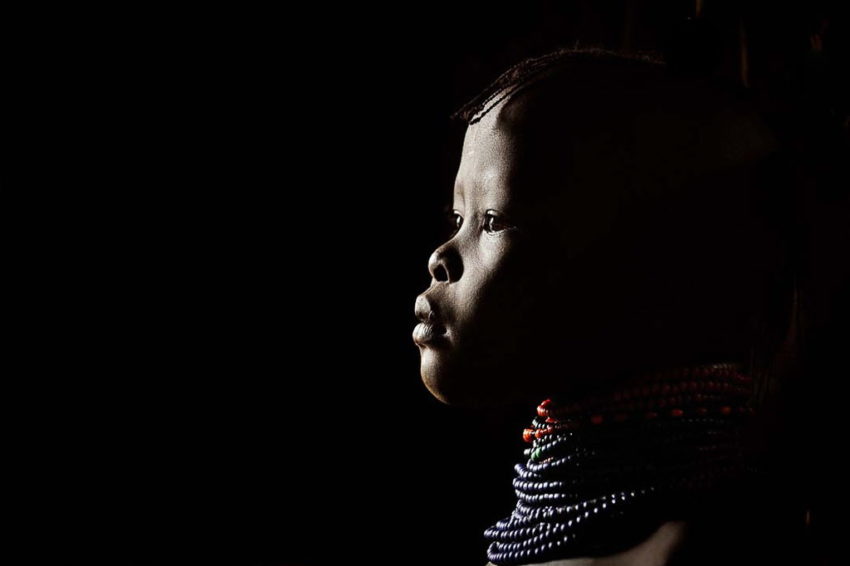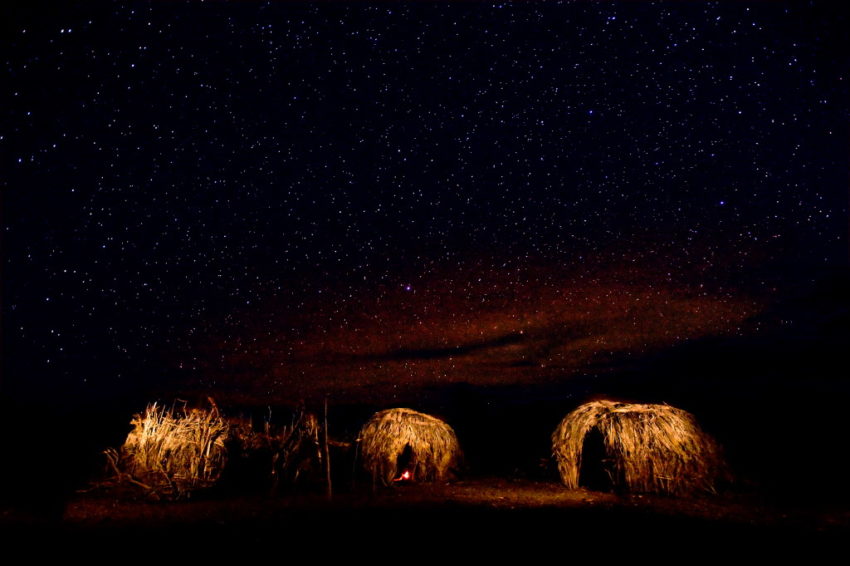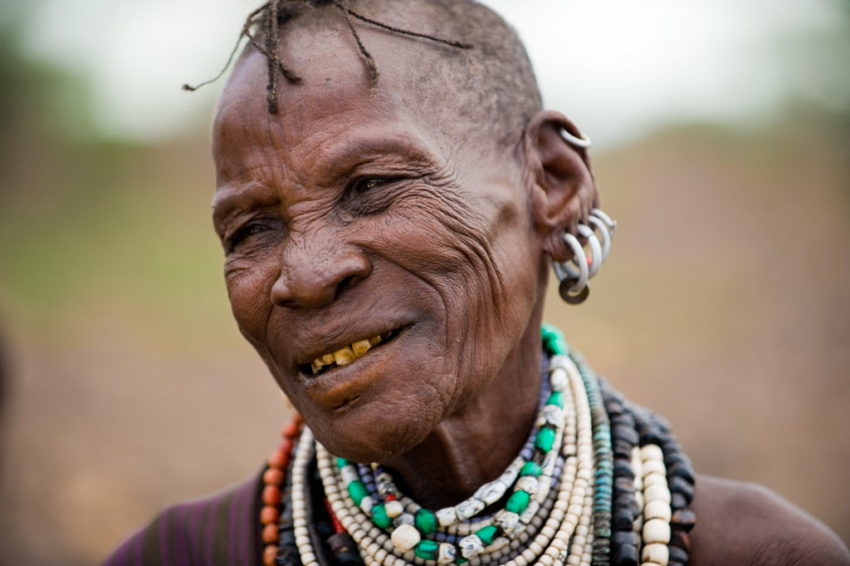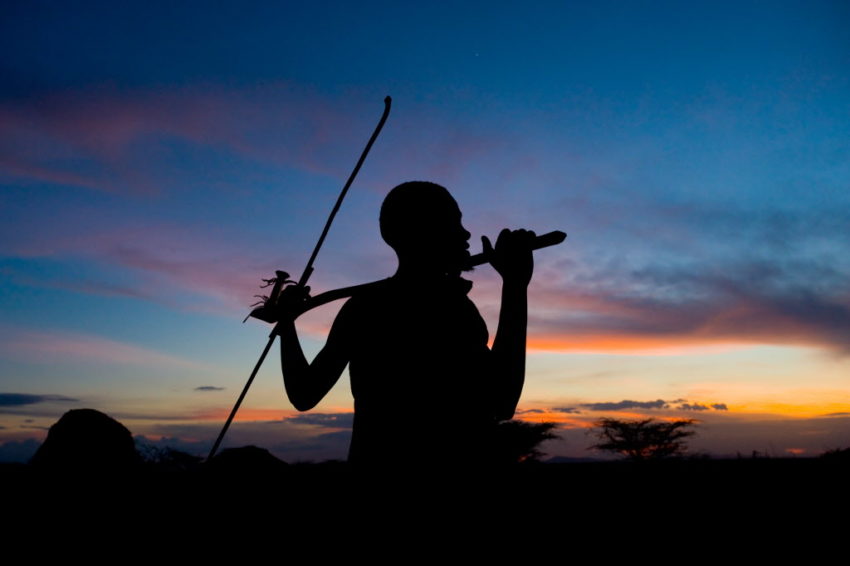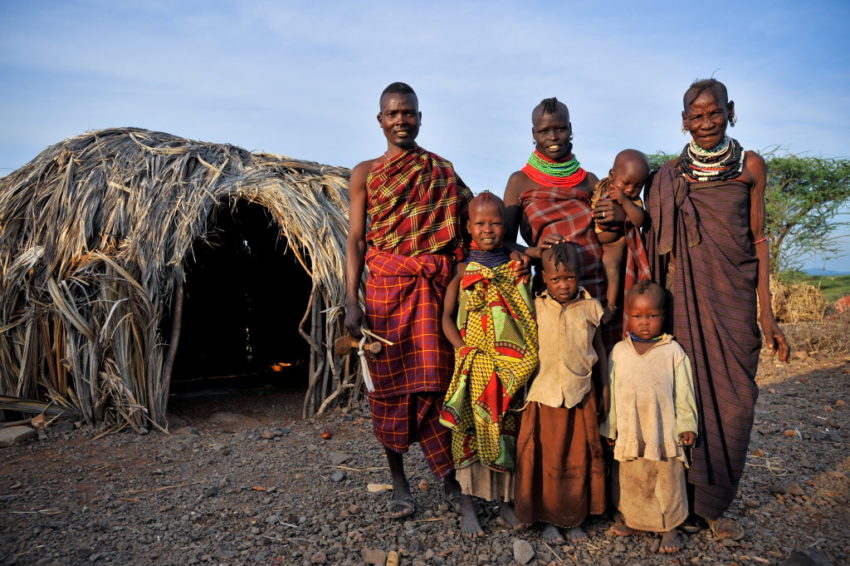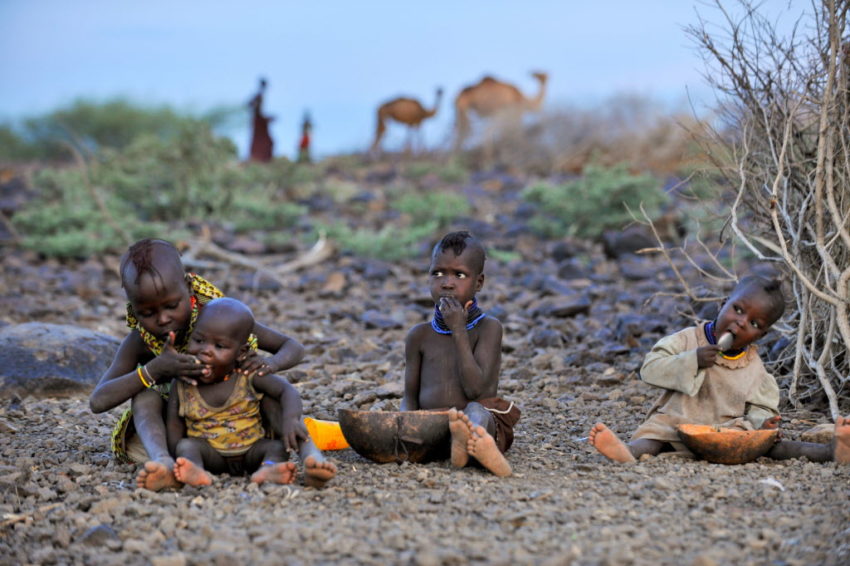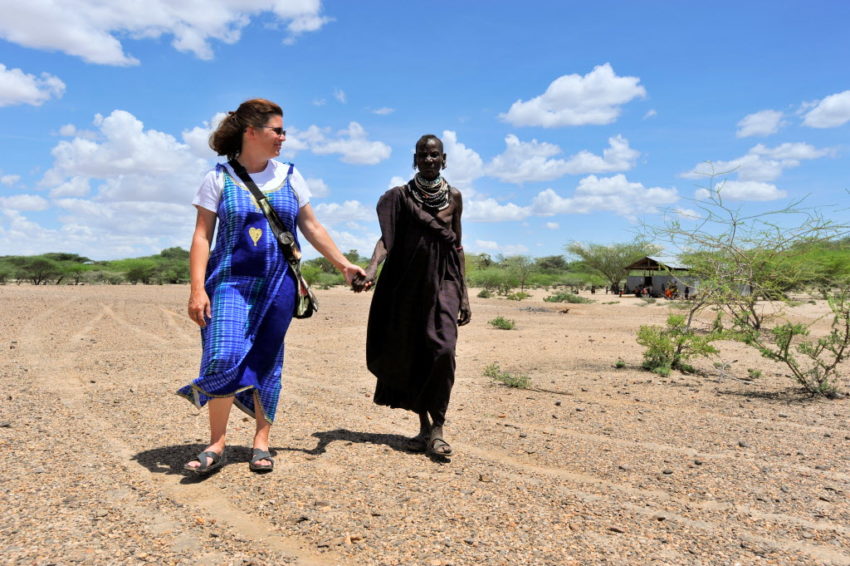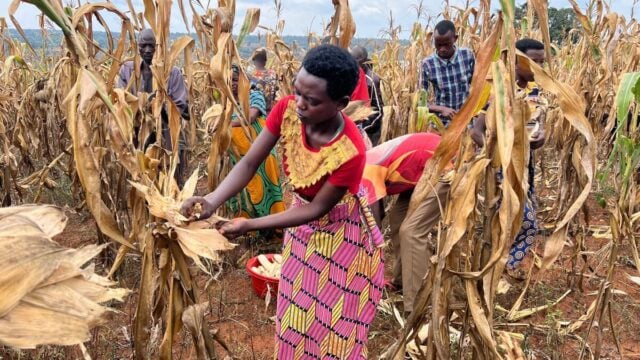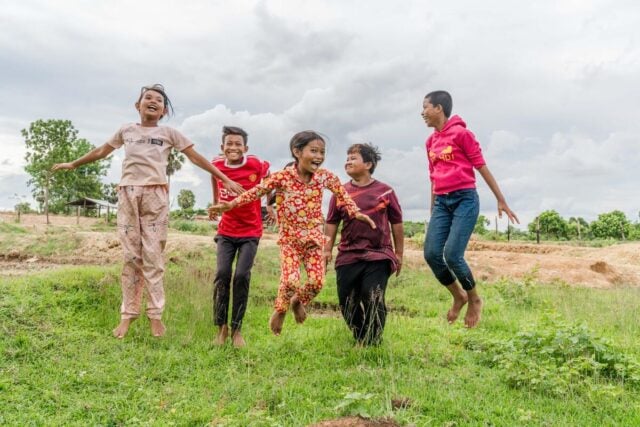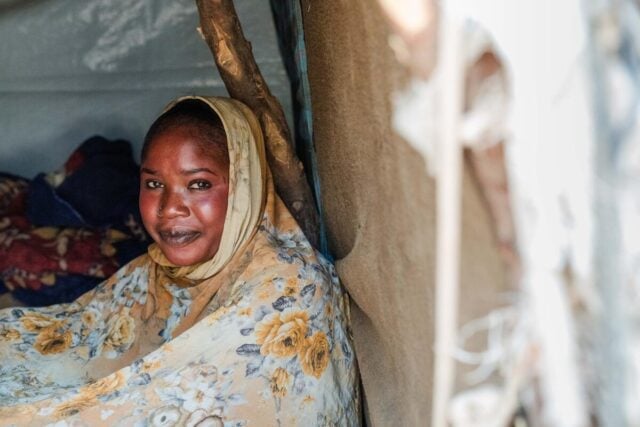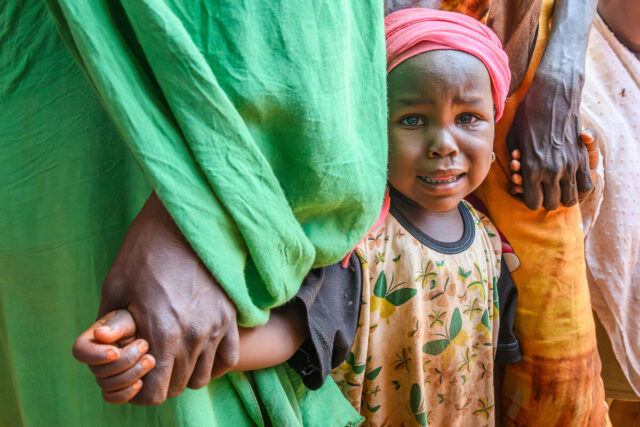Writer Kari Costanza and photographer Jon Warren learn firsthand what hunger feels like as they spend five days with a family in Turkana, Kenya. This story was originally published in 2010, when the family was living off food rations in the midst of a drought, but read to the end to find out how the family is doing in 2017 as another drought hits northwest Kenya.
Day one: World Vision’s monthly food distribution
Jon and I travel south from Lodwar, the Turkana district capital, to Kerkorisogol, a village named after the river that runs through it. But the Kerkorisogol River hasn’t flowed in a year and a half. Years of drought, a livestock disease, and increasingly vicious raids on herds have left people here without food and in danger of losing their primary assets — their animals.
The situation in Turkana is worsening, says Daniel Muhinja, World Vision’s nutrition manager. “Last year [the malnutrition rate] was 14.6%,” he tells us. “This year it is 22.5%.” And in Kerkorisogol, malnutrition rates are even higher. One of every four children is malnourished.
We arrive on the day of World Vision’s monthly food distribution. There’s been a delay, due to rain. But the people joyfully praise God for it. This is only the second day it has rained in the last 18 months.
At the distribution, we meet the woman we will live with: Ekomol Amodoi, who is loved and respected by her entire community. She has received food for herself and her four grandchildren — 114 pounds of corn, 11 pounds of yellow peas, 12 cups of vegetable oil, and 13.5 pounds of a nutritious corn-soybean blend. It seems like a lot of food, but I will come to find out that it doesn’t last.
World Vision workers help us carry our gear to Ekomol’s home, a hut made of palms. Its curved inner walls are sparsely decorated with household items — water jugs, meat jugs, milk jugs, rolled-up goatskins, harnesses the camels wear to carry big loads, and a small trunk. A big cowhide, complete with a tail, covers the dirt floor. Ekomol drags this outside and motions for us to sit down. I sit with Celine Achuku, 23, a World Vision food monitor. Having grown up in Turkana, she will be our translator and will help us get by in a place with no electricity, safe water, or bathrooms.
Ekomol, who doesn’t know her age but may be in her 60s, lives next to her two sons, 43-year-old Peter and 31-year-old Ekomoli. Peter has six children; Ekomoli has four. Today Ekomoli is off grazing the family’s livestock. Like many Turkana families, Ekomol and her sons are nomadic pastoralists, grazing their animals throughout northwestern Kenya. But with little rain, there is practically nothing for the animals to eat here. Yet grazing in other areas is increasingly perilous. Ekomoli’s recent eight-month trip in search of greener pastures led to disaster.
Iyanae, Ekomoli’s wife, pauses her cooking to tell me the story. “We were moving with the animals,” she says. “The raiders came. They shot two children and took the camels and the goats.” One of the teen boys died and the other was wounded as they tried to warn the adults.
Ekomol and Iyanae were wiped out, their “animal 401K” losing 97.5% of its value overnight. In all, they lost 312 goats, 38 camels, and 10 donkeys. The family’s herd had already been hit hard earlier in 2008 by peste des petits ruminants (PPR), a contagious virus that kills livestock. Now, they have only seven goats and two camels.
Iyanae, who is in her 20s, goes back to preparing the evening meal — the family’s first in days. Her 3-year-old daughter, Kamaret, rests on Ekomol’s lap while the food cooks. The girl is limp with hunger. “I want the porridge,” she tells her grandmother.
“It is very hot,” says her grandmother kindly, cradling the little girl.
“Just bring it, and I will eat it slowly,” says Kamaret.
But when it is time to eat, Iyanae serves us first. Tonight’s meal, the corn-soybean blend, tastes a little like polenta when mixed with water. We each get one cup. It tastes delicious. Everyone eats slowly and deliberately. The children use their fingers to lick up every drop.
After dinner, the clouds take on a pink cast. Near the equator, night comes quickly. In the dusk, Celine helps me make my way across the rocky terrain, pointing out acacia thorns so sharp that one has already pierced through the rubber sole of my shoe like a needle through cloth. She directs me to a tree that provides a little privacy from the huts — my bathroom for the next five days.
We make our way back to the hut and lie down. I smell the goatskins hanging from the walls and the cattle skin underneath me.
Peter pokes his head into the hut. He’s worried that I will be lonely, even though Celine is sleeping next to me. He plans to tell me a story after he eats his dinner. But when he comes back, I’ve already fallen into a sound sleep.
Day two: A taste of what hunger feels like
I wake to strange noises. My stomach is growling loudly. Outside, goats and sheep are bleating, begging to leave their pen. Someone I don’t know appears in the doorway: Ekomoli, Ekomol’s youngest son, who returned with the animals after dark last night.
Ekomoli, with a smile that lights up the hut, tells us he wants to welcome us by slaughtering a goat to eat. A long, friendly debate ensues. Through Celine, I convince him that we want to eat like the family eats and not be treated as guests. “Then you will take something to remember us by,” he says.
The livestock raid is foremost on Ekomoli’s mind. He and Iyanae left to graze the animals two days after their son was born in March 2008. “We left the [children] behind with the grandmother,” he says. “If all of us stay here, we will die of hunger. And we can’t take them with us. They can’t run away when the enemies come.”
He says, “This place is so dry. Why can’t we go to greener pastures in peace?”
Ekomoli recalls when his family settled in Kerkorisogol about 10 years ago. “We weren’t hungry all the time. We had animals,” he says. “Now we are dependent on relief food. I used to be strong. Now I lack energy.”
Ekomoli hates how hunger affects his children. “The children say, ‘Dad, we are so hungry that we can’t walk.’ You see them keeping quiet. When they eat, they play.”
Iyanae appears with tea made with camel’s milk. It tastes delicious. But by 10 a.m., I am hungry and tired.
Peter takes us on a walk. He points out the different kinds of wild fruits his family eats. He shows us the grave of his grandfather; Peter will be buried here as well. He points out his property lines and explains how people acquire land here. The chief decides, he says, based on how long your family has lived on the land and how well you bring up your children.
We come to a shallow river that formed after the rain. I walk in with my shoes still on. It feels so good to splash water over my arms and face.
When we get back from our walk, we find Kamaret using a sharp stone to peel wild fruit so the family can eat it — a daily task for the 3-year-old.
I go into the hut. Every minute seems doubled in the heat. I feel bad that I am not helping Kamaret, but I don’t want to go back into the sun, and I have no energy. This is not like me. At home, I can perform a multitude of activities at once, especially when getting my children ready for school in the morning — make their breakfasts, read the newspaper, take out the recycling, proofread homework, shower, and get dressed in less than an hour.
For lunch, we have a cup of yellow peas with a corn-soybean blend. It is amazing. It tastes like the split-pea soup I tried on a family vacation to California when I was little.
I remember many of our family occasions by the food we ate. My dad was a gourmet cook who showed his love for his three children by feeding us well. He greeted me every morning with a hot, healthy breakfast. Our school lunches were unlike other children’s; instead of bologna sandwiches on white bread, we had roast beef and alfalfa sprouts with thick-sliced tomatoes on seven-grain. In the summer, we ate fresh vegetables he grew in our garden. Dinner was a time to eat and talk, sometimes about the food my parents had enjoyed in Europe when they were just married: chateaubriand for two served with a béarnaise sauce so thick you could stand a spoon in it; white asparagus, tender and flavorful and eaten delicately with your fingers. We’d listen intently to these stories — and hope that someday we’d get a taste.
In the hut, I select the contents of each bite carefully, making my cupful last — I want to extend this meal as long as possible. I may not eat until the same time tomorrow, if at all. It occurs to me that when you don’t have food, you always think about getting food. When you have plenty, you dream up ways to make it taste better.
After lunch, the children crowd into the hut. The food has brought them back to life. Now they are ready to talk and sing, for the first time seeming curious about the visitors. I feel better, too, much readier to interact.
Ekidor, 8, the oldest grandchild, sits holding her 8-month-old brother, Amodoi, patting his bare rump as he begins his afternoon nap in her lap. “When I feel hungry, I just sleep,” says Ekidor. “I can’t even carry the baby. I just ask my grandmother for something to eat.”
Her 5-year-old sister, Lowosa, doesn’t want to talk about hunger. She feels so good after her lunch. “I am satisfied,” she says.
I ask the girls what they like to do when their tummies are full. “We like to sing songs praising God,” says Ekidor. “We learn them from our grandmother.” And, with that, they begin to sing: “God cannot change. But humans can. Brothers can change. A sister can change, but Jesus Christ never changes.”
Having a full stomach inspires Ekidor to dream about her future. “I will look after the animals and take care of my grandmother,” she says. “All this time, my grandmother has been very close to me. She takes care of my stomach.”
I ask about their favorite foods. “I like rice,” says Kamaret. “Beans,” says Ekidor with a nod. “I had meat eight months ago when this baby was born. I don’t know if I’ll have meat again because my dad doesn’t have [many] goats.”
After talking with the children, I go to wash in the river, which now looks more like a stream. I feel achy. My back hurts, and my stomach feels crampy. I don’t want to ask Ekomol about these symptoms because I’m afraid she’ll try to feed me.
Instead, I ask Peter about the children — how they handle not eating. “Sometimes the small children go for two days with nothing,” he says. After that, they have trouble keeping anything down. “When they take water, they vomit.”
What does he wish he could feed his family? “Beans, rice, and meat, but the best thing is the meat,” he says. “We used to have three meals a day when we had enough animals.”
But they haven’t eaten this way in more than a year. “This is the worst it has ever been. Hunger pains never go away,” Peter says, explaining what hunger feels like. “At times, I feel dizziness. When I want to walk, my legs get so weak they want to stop. At times, I [feel] like leaving my wife and children and going away to disappear. I would go away and let the enemies kill me, or just lie down and die and let the wild animals eat me.”
Peter’s admission is startling. Hunger robs him of his passion for life. I ask him how he gets through those dark times. “I pray to God,” he says. “And, when I see my mother, it gives me hope that God has a purpose in all this. She holds us in an umbrella of love.”
Ejore, Peter and Ekomoli’s sister who lives nearby, comes to visit. Ejore spies a dove near where Kamaret is peeling fruit. She picks up a rock and hides it behind her skirt, planning to kill the dove so they can eat it. Peter notices what is about to happen and cries out for her to stop. Ejore throws the rock away.
Later, I ask Peter about the incident. “The dove is like a sent agent of God,” he says. “And we see that God is faithful when we see the rain.” But it doesn’t rain again today.
Tonight, the stars are ablaze in the cloudless sky. It is impossible — dizzying — to take them all in. I’ve never seen the Milky Way look so spectacular, its foamy white fingers streaking across the universe. Milky Way is a candy bar, I think, as I drift off to sleep.
Day three: Dreaming of food
It is Sunday, the day for church. The children start by eating their father’s leftover maize from last night. “I didn’t eat [it all] purposefully because I knew there would be no food in the morning,” says Ekomoli.
Today the grownups will not eat. Because they share with their neighbors, relief food only lasts them about 10 days. One of their coping strategies is to fast some days.
We walk with Ekomol and Ekomoli to church, held in a schoolroom made of tin sheets held together with two-by-fours. As we wait for the service to begin, I ask Ekomol about her faith. During the hard years of her childhood, she did not know God. “We had no animals and no food. We depended on other people.” Ekomol’s brother began to take her to church. “The church transformed me,” she says.
Ekomol married and had children. When the family moved to Kerkorisogol about 10 years ago, they had 300 animals. “We had milk. We had meat. We had a strong breakfast,” she says. “Then, God wasn’t that far away. In those days, I prayed. I sang through the night.”
Now the drought, the livestock virus, and the animal raiders have created a poisonous stew. She worries that her sons will be attacked while grazing again.
Ekomol and I discuss her grandchildren, admitting something I have already noticed: Ekidor is her favorite. “I started taking care of her when she was 2 days old. I could tell she was going to be a special child.”
I know what it is like to have a special relationship with a grandparent. I was close to my grandfather, having been named for his mother. As the best Scandinavian eater of the grandchildren, I was treated to special Grandpa-prepared breakfasts of kippered herring, tea, and toast. At Christmas, he would watch with delight as I downed my plate of lutefisk. Ekidor told me that she loves how her grandmother “takes care of her stomach.” I am beginning to see how food and love are connected in a way that crosses cultures — whether or not it is a provision of plenty.
The pastor begins the service. “For two years, we didn’t have rain,” he says. “But for two days, we’ve had rain. We give God blessings.”
The congregation responds with an offering, collecting a few rumpled Kenyan shillings in a basket. Two older women dance the basket to the altar, circling each other like crested cranes dancing in a field. Later, I speak with one of the women, Ekadel Ngiro. “What happens if there is no money?” I ask.
“We dance even if it is empty because God sees us and understands us,” she says. “It is not always when we have something that we celebrate.”
After church, we prepare to leave. Jon must charge his camera batteries, so we have to go to Lodwar, where there is electricity. Ekomol and Ekomoli keep us company as we wait for a World Vision driver to pick us up.
Tired, I close my eyes and see a conveyor belt of sushi running through my brain: smoked eel wrapped in seaweed atop sticky rice; tempura prawns on a bed of romaine tossed with a sweet honey dressing; and dark pink sashimi salmon, begging to be dipped in soy sauce.
I open my eyes and ask Ekomoli if he dreams about food. He says he dreams about meat, “but when I wake up, there is no food.” Just then, the pastor brings food his wife has prepared, rice topped with lentils. “In our tradition, we share,” says the pastor kindly, “just like Americans.”
Ekurichanait Naborkut, 34, the head teacher at Kerkorisogol School, greets us and tells us about hunger’s effect on students. “When there is no food, the children become sleepy,” he says. About 80 kids attend school every day. But more and more, children are staying out of school to do chores to earn a few shillings to buy food, or they forage for food.
The teacher can tell who is hungry by their appearance. “When you have not eaten, you get wrinkles on your forehead,” says Ekurichanait. And he can tell by their grades. “When nutrition status goes down, the IQ retards.”
The driver arrives to take us to charge our equipment overnight. From the touching church service to the Sunday dinner that appeared out of a dream, it has been an incredible day. I wish Ekomol’s family could have the food that fills their dreams.
Day four: Feeling hungry
I wake up in the morning in a Lodwar guesthouse, camera batteries charged, and feeling recharged myself after sleeping on a bed and using a real bathroom. We decide we can have a cup of tea before we leave, since we think Ekomol’s family might be having tea this morning.
We talk about food all the way to Kerkorisogol, such as the special food hostages ask for when their ordeal ends — often, hamburgers. I don’t want a hamburger. Right now I want fried chicken, mashed potatoes, gravy, and biscuits, or a wonderful spaghetti dish my grandmother used to make, featuring canned spaghetti.
When we arrive, all the children but Ekidor are sleeping. No one has eaten anything yet today.
“I am feeling hungry, but I have to bear it because we won’t eat until evening,” says Ekidor. She enjoys being with the animals, which distracts her from hunger. What she likes best is going to school, but her family has no money to pay for school supplies.
Ekomoli comes back from grazing the animals, and Iyanae milks the goats, moving nimbly over the volcanic earth. Afterward, the children gather around her. The baby, Amodoi, claps his hands. He is smart; at 8 months, he can already say “mama” and Jon’s name.
The children play games with little rocks, cupping them in their hands, tossing them up, and then catching them on the backs of their hands to see how many land between their knuckles. Ekidor can catch at least six.
“The girls walked at 8 or 9 months, but now they are getting weak,” says Ekomol. She glances over at her favorite granddaughter. “Ekidor is losing her dimples.”
The family has come to a life-changing decision. Ekomoli and Iyanae will no longer leave the area to graze the animals. The raids have made it too dangerous. “I would rather stay here and die poor than fight those enemies,” says Iyanae. Now they will have to find another way to survive. With the lack of rain and the rocky soil, farming seems impossible.
We eat our last dinner together — a cup of the corn-soybean blend stretched with the wild fruit Kamaret has prepared. It has gotten dark, making it hard to see tonight’s porridge, but it looks a little greenish, and it has a sawdust-like texture. As the food supply diminishes, it is becoming less appetizing.
Ekomoli gazes up at the starry heavens, Kamaret bundled in his lap. “I look to the sky because it gives direction to my life,” he says.
When I look to the star-crowded sky, I find it breathtaking. But to Ekomoli, a sky without clouds means more dry weather. And dry weather means hunger. How will he take care of his family?
Day five: Goodbye to hunger
I wake up this morning to a beautiful sound: Ekomoli singing to his children. His voice is rich and melodic. I peer from the hut to watch and listen. The girls and baby Amodoi are trying to find a place to sit on their father’s lithe frame. Ekomoli is my height but must weigh 40 pounds less than me. There is not an ounce of extra fat on anyone here.
There is no breakfast.
We walk with the family to the village center half an hour away. We leave behind the food we’ve brought to restock what we ate from the family’s rations. Ekomoli stays behind for a few minutes to lock up the sugar in the trunk. Sugar is as valuable as shillings for people in Turkana.
As promised, Ekomoli gives me something from the hut — a handmade container for goat meat. I am touched that he would offer me one of their few possessions.
It is hard to say goodbye. My heart is as heavy as my stomach is empty. Ekomol takes hold of my hand as we walk toward the car. My throat constricts, and the tears begin to rise. I will miss this family. They are such good people.
My heart is as heavy as my stomach is empty.—Kari Costanza
Back in Lodwar, we have lunch, goat with rice and green vegetables. I think of Ekidor and Kamaret and how they would love this meal. I want to enjoy it on their behalf. But halfway through the meal, my stomach begins to cramp. I rush to the bathroom where I am violently ill. My system was depleted after eating just one cup of food per day.
As much as I’ve observed about food in my 46 years, I learned in these five days what hunger feels like — it permeates life. Hunger is a killer of things both great and small, destroying simple desires and big dreams. It impacts how you walk the earth and consider the stars. When a clear night’s majesty causes a hungry father to feel angst instead of ecstasy, there is something wrong with our world.
‘Stay well with everybody’
In April 2017, photographer Jon Warren and I flew back to Turkana, Kenya, to report on the drought that’s swallowing up lives and livelihoods in East Africa. It’s a monster crisis, affecting 25 million people. I was shocked by what I saw: the carcasses of dead animals gleaming white against the brown sand, bone dry river beds, and clinics filled with crying, severely malnourished babies in the arms of their worried mothers.
After covering tough stories for a week and a half — visiting a home now headed by children whose parents died because of drought, mothers who could no longer breastfeed their babies, people from young to old speaking openly about how they feared death — we asked our driver if we could go find Ekomol and her family.
The family greeted us with hugs, but there was something missing. Ekomol’s hut was empty. She had died on March 15. We had missed her by just one month. Like the others in East Africa, their family had not escaped the ravages of the drought. Peter was stick thin. Ekomoli’s hair had grayed. The girls were in school, but their parents were concerned that they will have to drop out because there was no money left.
I had learned so much from Ekomol during our time with her — how she cared for her family and the land around her. How she trusted God with everything, even though the family had nothing. I had watched her share food rations with her neighbors and with us. I had felt her strength during a time of hunger that would bring most people to their knees.
Ekomol couldn’t read, but she lived out the words written in Matthew 25: “For I was hungry and you gave me food, I was thirsty and you gave me drink, I was a stranger and you welcomed me, I was naked and you clothed me, I was sick and you visited me, I was in prison and you came to me.”
I asked Ekomol’s granddaughter Ekidor what her final words had been. “Stay well with everybody,” Ekidor told me. “Stay well with everybody.’”
Isn’t that what Matthew 25:40 commands? That how you stay well with everybody, is how you stay well with Jesus. That’s what Ekomol did. She welcomed us and made sure we were fed. She provided a cow hide for us to sleep upon. She asked us about our health and well-being. And she unlocked new ideas in our minds — how a life of abject poverty does not preclude a life of spiritual plenty.
Ekomol may be gone but her words sound in my heart: “Stay well with everybody.” It’s a fitting picture of God’s economy, that this remarkable woman considered among “the least of these” was the one who taught me the most.
